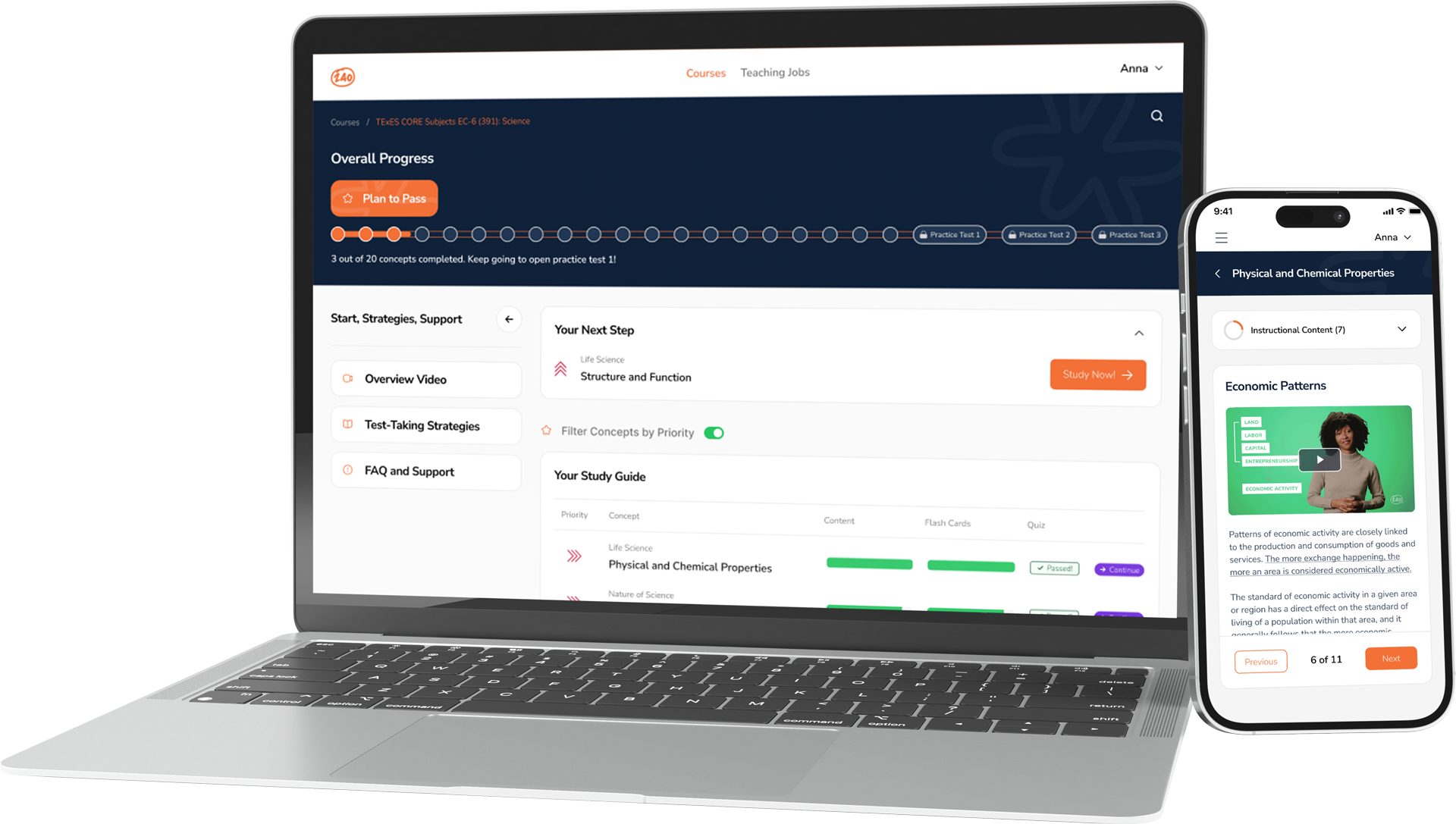Not sure what to study, or if you are going to pass? We can help!
I'm a teacher candidate at a university/college I'd like to transition to teaching I'm a current / former teacher I'm in leadership for K-12 or Higher Ed (EPP)Our Top Tips for First-Year Teachers

 Your first year as a teacher will be exciting and rewarding but also completely overwhelming at times. When starting your career, it’s important to get valuable first-year teacher advice from experienced educators. Here at 240 Tutoring, we have over 60 years of collective experience teaching students in the classroom and developing curriculum for educators. We’ve gathered some of the top tips for first-year teachers to help you start your career off right.
Your first year as a teacher will be exciting and rewarding but also completely overwhelming at times. When starting your career, it’s important to get valuable first-year teacher advice from experienced educators. Here at 240 Tutoring, we have over 60 years of collective experience teaching students in the classroom and developing curriculum for educators. We’ve gathered some of the top tips for first-year teachers to help you start your career off right.
Classroom-Tested Advice for First-Year Teachers
Tip 1: Prioritize Your Tasks
Teaching is a profession where there will always be an ongoing to-do list. Even the most efficient and experienced teachers aren’t able to get everything done. Each week, organize your tasks by thinking about what absolutely has to be done, what can be postponed if necessary and what will be OK if it doesn’t get completed. If you have time to do some of the “bonus” tasks, that’s great! But it’s also OK if that Pinterest-worthy bulletin board gets put off until next month, next semester or even next year.
When your to-do list inevitably gets overwhelming, focus on the the following tasks:
- Prepare lessons and materials: Your students’ learning and engagement should always be your number one priority. Every afternoon, review your plans for the next day and set out the supplies and materials you will need. This small step will make a world of difference the next day.
- Grade something each week: While grading papers may not always be urgent, it’s easy to fall behind on this task. Grade a few assignments each week to avoid having piles of assignments the day before grades are due. Trust us, you’ll thank yourself later.
- Communicate with families: This is another task that can easily be pushed aside but is important to keep up with. Find out from your team members how often you should communicate with students’ families. Then find a system that works well for you and stick to it. Many teachers send weekly newsletters to all families and schedule individual conferences at intervals throughout the year. Make sure to keep a record of when families were contacted and what was discussed.
- Document: New teachers often underestimate the amount of time they’ll need to spend documenting students’ behavior and academic progress. Having written records is important, especially when you have a concern about a student. Set aside time each week to record brief notes on students’ progress. With specific events, try to record what happened as quickly as possible. It’s easy to tell yourself that you’ll remember all of the details, but by the end of the day you may have forgotten exactly what was said or who was involved. If you aren’t able to write a detailed description at the time, list a few key notes and write a lengthier record at the end of the school day.
Tip 2: Ask Questions
Your first year of teaching will be filled with questions. From acronyms to policies to best teaching strategies, there is a lot to learn! It’s easy for veteran teachers to forget how much is completely new for a first year teacher, so don’t be embarrassed to ask about something that seems like common knowledge to your colleagues. Chances are, they had the same question when they first started teaching too!
At times you may feel like you have so many questions that you don’t even know where to start. A helpful strategy is to write down questions as you think of them, then sit down to discuss your list of questions with a mentor teacher. You may find it helpful to schedule a weekly “check-in” with your mentor teacher or team leader to go over any new questions you have. _
Tip 3: Find an Organization Strategy That Works for YOU
There is so much to consider when it comes to organization and record-keeping. How will you organize students’ assignments? Where will you keep copies and materials for the upcoming week? How will you keep records of parent communication?
If you’re not sure where to start, ask other teachers to share their strategies with you. Next, check out online resources such as Teachers Pay Teachers for parent conference forms, small group observation, behavior tracking forms, etc. Take note of what you like, and adapt it to fit your needs. Some teachers find it easier to store handwritten documentation organized into binders. Others prefer to do all of their documentation on a computer. (If you do this, make sure you backup your computer regularly.) Focus on finding a streamlined process that fits your own organization style.
Tip 4: Have a Strong Classroom Management Strategy
Classroom management is a crucial component of teaching. Teachers with strong classroom management have fewer disruptions, smoother lessons, and more engaged students. Before the school year begins, make sure you have thought about all aspects of your classroom management style.
One of the most important parts of classroom management is establishing and practicing routines. This is especially important for elementary teachers. Model for students even the smallest procedures such as lining up, walking from their seat to the rug, or getting their lunchbox from their locker. Have students practice these routines several times during the first days of school, and continue to remind students of the expectations throughout the year.
It’s also important that students know the expectations and consequences ahead of time. Children naturally test boundaries. Establish limits and consequences early on, and always follow through with consequences. Keep in mind that “firm” does not equal “harsh.” A consequence can be given in a respectful manner that allows you to maintain a positive relationship with the student.
Tip 5: Ask for a Mentor Teacher
Many schools will assign you a mentor teacher for your first year. If not, ask your principal for one. Mentor teachers are there to answer a variety of questions from minor (“Which copy machine should I use?”) to major (“Who should I speak with regarding a student with violent behavior?”). Other questions you might ask your mentor teacher include:
- What is your best classroom management tip?
- What is the school’s policy on students turning in late assignments?
- Are there school-wide expectations for the hallway, playground, and cafeteria?
- How often should I be communicating with parents?
- Are there materials such as chart paper, manipulatives, or leveled readers that I can access?
- Have you noticed anything I can improve on?
You can also ask your mentor teacher to observe one of your lessons and give feedback or observe one of their lessons for ideas. Depending on scheduling, you may need to film the lesson to be observed. If this is the case, make sure to get permission first!
Tip 6: Visit Other Teachers’ Classrooms
Simply walking through another teacher’s classroom can give you a wealth of great ideas. Take note of seating arrangements, posters and reference materials, stations and centers, manipulatives, class libraries, job charts, etc. If it’s OK with the teacher, take pictures of your favorite ideas so you can implement them in your own classroom.
This is a great time to ask teachers where they got specific resources, how they use certain materials, and how they chose the layout of their classroom. Most teachers will be happy to take the time to show you around their room and discuss ideas with you. You may even find that some teachers offer you supplies or materials that they aren’t using anymore.
Tip 7: Get Involved (But Don’t Try to Do it All)
There are many ways to become involved with your school and community. Volunteering for events is a great way to build relationships with families and show support for your school. Signing up for school committees can help you gain new knowledge and build relationships with other teachers. Going to your students’ after school activities shows that you care about their interests.
Keep in mind, however, that no one expects you to say yes to every extracurricular activity or sign up for every committee. Take a look at the school’s events calendar for the upcoming months and decide in advance what you can and can’t attend. If you’re unsure whether or not you should go to a certain event, ask other teachers if they are going and what the expectations are. If most teachers are attending, it’s probably a good idea to make every effort to go.
Tip 8: Overplan the First Week
The first days of school are a whirlwind for everyone, but especially for first year teachers. When thinking about the first few days with students, walk yourself through every minute of the day and what you will need to do. What will students do when they first arrive? Where will you store the supplies they bring? What are the procedures in the cafeteria? What time should students start getting ready for dismissal? (Tip: It’s earlier than you think!) Do you know how every student is getting home, including bus numbers?
Walk through your day with another teacher, asking them to point out things you may not have thought about. Each day of the first week will be a little different, so make sure you think through every detail for the first several days.
Tip 9: Be Flexible
Ask any teacher and they’ll tell you that a school day rarely goes exactly as planned. Successful teachers have learned to be flexible and adapt their plans when necessary.
While many disruptions can’t be planned for, it helps to think in advance about how you will handle certain situations. For example, what will you do if you get a new student with no advance notice? How will you handle a student getting sick in the middle of a lesson? How will you get students back on track after a fire drill? Thinking about these situations in advance will help you feel more in control whenever they arise.
However, there will always be something you haven’t accounted for. When this happens, stay calm, change what you can, and let go of what you can’t. Your students will follow your lead, and soon you’ll be back on track with your day.
Tip 10: Be Confident
Confidence is key when it comes to communicating with students, their families, and with school administration. During parent conferences or meetings with administration, speak in a warm but self-assured tone to convey confidence. You may not always feel like it, but you know more than you realize.
Keep in mind that you can be confident and admit what you don’t know. Chances are, you’ll eventually be put on the spot with a question you don’t have an answer to. When this happens, the best thing to do is reply with, “I don’t know the answer to that, but I will look into it and get back with you as quickly as possible.” Then, follow through by asking a colleague or by searching other resources for the answer.
Along with families and administration, strive to be confident in your interactions with other teachers as well. Yes, you have a lot to learn. But you also bring with you a fresh set of eyes, the most up-to-date research, and a passion for education. Don’t be afraid to share your knowledge and ideas with your colleagues; you’ll learn a lot from experienced teachers, but they can also learn from YOU.
It’s easy to become overwhelmed as you jump into the world of education, but remember, every teacher was once a first-year teacher themselves. They will gladly share their advice and wisdom with you. And when you need some extra tips, 240 Tutoring is here to help!


